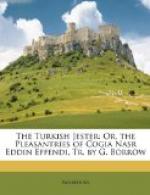One day the boys of the town said to one another, ’Come, let us get the Cogia to climb a tree, and we will steal away his sandals.’ The boys coming to the foot of a tree stopped, and said, ’No one can climb this tree.’ The Cogia coming up, said, ‘I can climb it.’ ‘No, you can’t,’ said they. Forthwith the Cogia tied the skirts of his robe about his loins and put his sandals in his bosom. ‘O Cogia Efendi,’ said the boys, ‘what will you do with your slippers in the tree?’ Said the Cogia, ’If I find a road when I am above there, I shall have my slippers ready to put on.’
One day a man coming from the country brought the Cogia a hare. The Cogia, with much politeness and civility, gave him some broth to eat. At the end of a week he came again; but the Cogia appearing to have forgot him, said, ‘Who may you be?’ ‘I am the person who brought the hare,’ said the man; whereupon the Cogia again entertained him. After some days a number of men made their appearance and wanted to be entertained. ’Who may you be?’ said the Cogia. ’We are the neighbours of the man who brought you the hare,’ said they. A few days after a whole troop of men arriving, the Cogia asked them who they were? ’We are the neighbours of the neighbours of the man who brought the hare,’ said they. ’You are quite welcome,’ said the Cogia, and placed before them a large jar of pure water; on seeing which they said, ‘What is this?’ ’The water of the water of the hare is what it is,’ said the Cogia.
One day the Cogia, whilst labouring in the field, found a tortoise, and, seizing hold of it, tied a string round its neck and hung it to his spade. The tortoise beginning to cry and squeal, ’It is of no use crying,’ said the Cogia, ‘you must now learn to work.’
One day the Cogia, being on the point of death, called his neighbours about him. The neighbours coming, began to eat and make merry, without saying to the Cogia, ‘Come and partake.’ The Cogia incensed, got up and went out. After a little time they sought for the Cogia, and could not find him; so dispersing themselves about, they went after him, and at last found him. ‘Ho, Cogia,’ said they, ‘come, where have you got to?’ Said the Cogia, ’He who this day supplies the bridal meats has, surely, a right to go into the bridal chamber.’
One day the Cogia, being out on a journey, encamped along with a caravan, and tied up his horse along with the others. When it was morning the Cogia could not find his horse amongst the rest, not knowing how to distinguish it; forthwith taking a bow and arrow in his hand, he said, ‘Men, men, I have lost my horse.’ Every one laughing, took his own horse; and the Cogia looking, saw a horse which he instantly knew to be his own. Forthwith placing his right foot in the stirrup, he mounted the horse, so that his face looked to the horse’s tail. ‘O Cogia,’ said they, ‘why do you mount the horse the wrong way?’ ‘It is not my fault,’ said he, ‘but the horse’s, for the horse is left-handed.’




